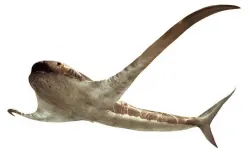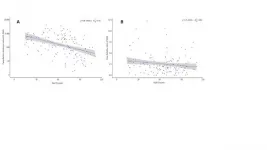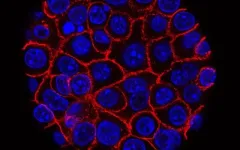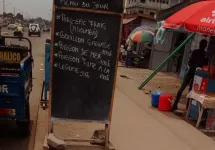Discovery of a 'winged' shark in the Cretaceous seas
2021-03-18
(Press-News.org) 93 million years ago, bizarre, winged sharks swam in the waters of the Gulf of Mexico. This newly described fossil species, called Aquilolamna milarcae, has allowed its discoverers to erect a new family. Like manta rays, these 'eagle sharks' are characterised by extremely long and thin pectoral fins reminiscent of wings. The specimen studied was 1.65 metres long and had a span of 1.90 metres.
Aquilolamna milarcae had a caudal fin with a well-developed superior lobe, typical of most pelagic sharks, such as whale sharks and tiger sharks. Thus, its anatomical features thus give it a chimeric appearance that combines both sharks and rays.
With its large mouth and supposed very small teeth, it must have fed on plankton, according to the international research team led by Romain Vullo of the CNRS.
Scientists have identified only one category of large plankton feeders in Cretaceous seasuntil now: a group of large bony fish (pachycormidae), which is now extinct. Thanks to this discovery, they now know that a second group, the eagle sharks, was also present in the Cretaceous oceans.
The complete specimen was found in 2012 in Vallecillo (Mexico), a locality yielding remarkably preserved fossils. This site, already famous for its many fossils of ammonites, bony fish and other marine reptiles, is most useful for documenting the evolution of oceanic animals.
As well as shedding light on the structure of Cretaceous marine ecosystems, the discovery of eagle sharks reveals a new, hitherto unsuspected, facet of sharks' evolutionary history.
INFORMATION:
[Attachments] See images for this press release:

ELSE PRESS RELEASES FROM THIS DATE:
2021-03-18
It's not just how hot the fires burn - it's also where they burn that matters. During the recent extreme fire season in Australia, which began in 2019 and burned into 2020, millions of tons of smoke particles were released into the atmosphere. Most of those particles followed a typical pattern, settling to the ground after a day or week; yet the ones created in fires burning in one corner of the country managed to blanket the entire Southern hemisphere for months. A pair of Israeli scientists managed to track puzzling January and February 2020 spikes in a measure of particle-laden haze to those fires, and then, in a paper recently published in Science, they ...
2021-03-18
INDIANAPOLIS -- The ongoing COVID-19 pandemic is keeping millions of Americans from their usual offices, as they find themselves still working at home. Even with the vaccine now being distributed, working from home may still be the future for some, and new research suggests the resulting work loneliness negatively impacts employee well-being. ...
2021-03-18
Researchers who simulated early stages of the SARS-CoV-2 outbreak in Wuhan, China, conclude that the virus was likely circulating earlier than has been described, possibly even in mid-October 2019. The findings do not reveal whether the virus that first emerged was less "fit" than the virus that spread throughout China, say the authors, but the estimates do further distance the first ("index") case from the outbreak at the Huanan Seafood Wholesale Market, which has received much attention. A concerted effort has been made to determine when the SARS-CoV-2 virus ...
2021-03-18
Have you forgotten where you laid your keys? Ever wondered where you had parked your car? Or having trouble remembering the name of the new neighbor? Unfortunately, these things seem to get worse as one gets older. A big question for researchers is where does benign forgetfulness end and true disease begin?
One of the keys to having a healthy brain at any age is having a healthy blood-brain barrier, a complex interface of blood vessels that run through the brain. Researchers reviewed more than 150 articles to look at what happens to the blood-brain barrier as we age. Their findings were published March 15 in Nature ...
2021-03-18
LOS ALAMOS, N.M., March 18, 2021--A new, simpler solution process for fabricating stable perovskite solar cells overcomes the key bottleneck to large-scale production and commercialization of this promising renewable-energy technology, which has remained tantalizingly out of reach for more than a decade.
"Our work paves the way for low-cost, high-throughput commercial-scale production of large-scale solar modules in the near future," said Wanyi Nie, a research scientist fellow in the Center of Integrated Nanotechnologies at Los Alamos National Laboratory and corresponding ...
2021-03-18
During a pandemic like COVID-19, vulnerable countries are traditionally the focus of global attention and concern. However, new research suggests that we need to rebuild our understanding. A study published in KeAi's Global Health Journal, examined the relationship between state vulnerabilities (measured using the Fragile States Index (FSI) from Fund for Peace) and COVID-19 incidence and death rates in 146 countries. The FSI consists of 12 specific indicators covering cohesion, economy, politics and society. "When using the total FSI score for statistical analysis, we were surprised to find that, overall, the more fragile countries had lower cumulative incidence and fatality rates for COVID-19," explains one of the study's authors, Yangmu ...
2021-03-18
In new findings published online March 18, 2021 in the journal Cancer Cell, an international team of researchers, led by scientists at University of California San Diego School of Medicine and Moores Cancer Center, describe how pancreatic cancer cells use an alternative method to find necessary nutrients, defying current therapies, to help them grow and spread.
Pancreatic cancer accounts for roughly 3 percent of all cancers in the United States, but it is among the most aggressive and deadly, resulting in 7 percent of all cancer deaths annually. Pancreatic cancer is especially deadly once it metastasizes, with the number of people who are alive five years later declining from 37 percent to just 3 percent.
All cancer cells require a constant supply of nutrients. Some types ...
2021-03-18
Smart glass can change its color quickly through electricity. A new material developed by chemists of Ludwig-Maximilians-Universität (LMU) in Munich has now set a speed record for such a change.
On the highway at night. It rains, the bright headlights of the car behind you are blinding. How convenient to have an automatically dimming rearview mirror in such a case. Technically, this helpful extra is based on electrochromic materials. When a voltage is applied, their light absorption and color change. Controlled by a light sensor, the rearview mirror can thus filter out strongly dazzling light.
Recently, experts discovered that, in addition to established inorganic electrochromic materials, a new generation of highly ordered lattice structures can also be equipped ...
2021-03-18
KINSHASA, DEMOCRATIC REPUBLIC OF CONGO (March 18, 2021) - A new study in the journal Conservation Science and Practice finds that restaurants in urban areas in Central Africa play a key role in whether protected wildlife winds up on the menu.
The study, by a team of scientists from Michigan State University, Wildlife Conservation Society (WCS), and University of Maryland, used a crime science "hot product" approach, which looks at frequently stolen items coveted by thieves. The approach offered new insights into wildlife targeted by the urban wild meat trade and can inform urban wildlife policies.
The study engaged lower, middle, and upper-level tiered restaurants to understand which species were traded. ...
2021-03-18
Detailed, new analysis published this week in the British Medical Journal (BMJ) Open highlights significant concerns about a growing issue of sex selective abortion of girls in Nepal.
Drawing on census data from 2011 and follow-on survey data from 2016, the social scientists estimate that roughly one in 50 girl births were 'missing' from records (i.e. had been aborted) between 2006-11 (22,540 girl births in total). In the year before the census (June 2010 - June 2011) this had risen to one in 38.
For certain areas of the country, the practice was more widespread. In Arghakhanchi, the most affected district, one in every six girl births were 'missing' in census data. In the Kathmandu Valley, Nepal's main urban centre, around 115 boys are born for ...
LAST 30 PRESS RELEASES:
[Press-News.org] Discovery of a 'winged' shark in the Cretaceous seas





